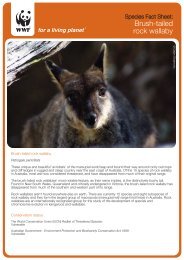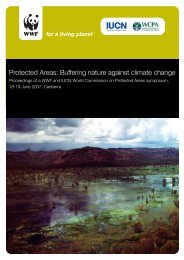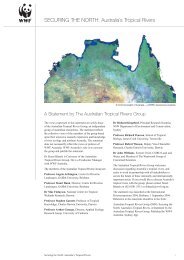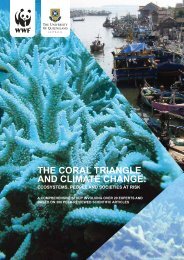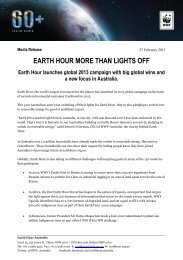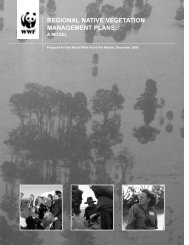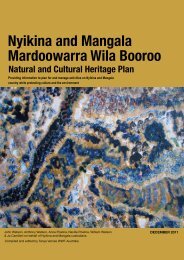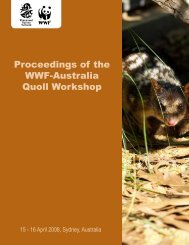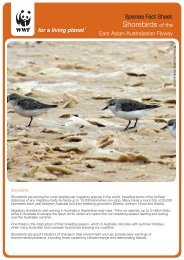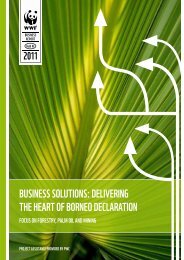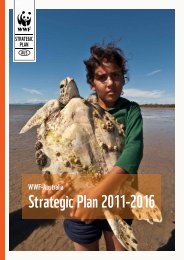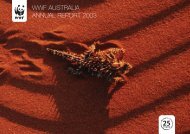Indigenous Peoples and Conservation Organizations
Indigenous Peoples and Conservation Organizations
Indigenous Peoples and Conservation Organizations
Create successful ePaper yourself
Turn your PDF publications into a flip-book with our unique Google optimized e-Paper software.
The Xavante in Central Brazil 57<br />
With Xavante unable to manage processing <strong>and</strong><br />
packaging or even to provide adequate raw materials<br />
<strong>and</strong> labor, there can be no doubt that the<br />
fruit-processing venture was a failure. Several<br />
factors help explain this <strong>and</strong> provide contrast for<br />
what eventually happened in the wildlife management<br />
project. One reason the effort never<br />
took off was the failure to root the project in the<br />
cultural dynamics of the community. It was a<br />
basic flaw in project design that no one wondered<br />
what impact the gender division of labor in<br />
Xavante society would have on the enterprise.<br />
The fruit project placed an unreasonable burden<br />
on women, the collectors <strong>and</strong> processors of food<br />
in this society. Xavante women have the least<br />
free time yet were expected to bear the brunt of<br />
this new labor. Many later problems might have<br />
been anticipated if women, who were to be principal<br />
actors in implementing the project, had<br />
been asked to participate in designing the project.<br />
Although women were enthusiastic at first about<br />
the money they would generate, their enthusiasm<br />
declined in t<strong>and</strong>em with the failure of cash flows<br />
to materialize quickly (Aparicio Gabara 1994,<br />
129). No one explained beforeh<strong>and</strong> that the market<br />
economy dem<strong>and</strong>s major start-up costs <strong>and</strong><br />
labor investments before a profit can be realized.<br />
The women also expected other immediate<br />
rewards for their labor, such as clothing. As<br />
motivation waned, it became clear that workers<br />
were not maintaining the sanitary requirements<br />
for h<strong>and</strong>ling fruits such as pequi. They were also<br />
not collecting sufficient surplus to gear production<br />
to scale. The fruit shortage was exacerbated<br />
because few of the trees that were supposed to be<br />
planted for harvesting were in fact planted. All<br />
of this implies that the women <strong>and</strong> the community<br />
itself never felt the project belonged to them.<br />
Another problem was that the project rapidly<br />
became hooked on relatively high levels of technology<br />
without concomitant technical support.<br />
One observer noted that no one involved in the<br />
enterprise had experience in operating such a facility.<br />
Rather than slowly developing processing <strong>and</strong><br />
marketing skills at a level commensurate with<br />
what could be produced by community members<br />
with the available resources, project designers separated<br />
ends from means. They too quickly aspired<br />
to acquire the elaborate infrastructure for success<br />
without having a clue about how to attain or sustain<br />
it. Echoing what had happened in FUNAI’s<br />
rice projects, once again acquisition of material<br />
goods as a sign of status, in this case the fruit-processing<br />
factory, became an end in itself.<br />
After 1994, the IAF <strong>and</strong> the EC withdrew support<br />
for the project. The processing plant<br />
remains unused, a monument to an appetite for<br />
material goods <strong>and</strong> to overwhelming ambition.<br />
The problems that undermined the fruit project<br />
stem from lack of consistent monitoring by funders,<br />
technical support, background information,<br />
<strong>and</strong> dialogue among all the parties involved.<br />
IV. The Wildlife Management<br />
Project<br />
Whereas IAF <strong>and</strong> EC funds supported implementation<br />
of technological innovations <strong>and</strong> infrastructure,<br />
WWF funding primarily supported<br />
research. This began in 1991 when Frans<br />
Leeuwenberg, a wildlife biologist contracted by<br />
the CPI, initiated fieldwork designed to uncover<br />
why the reserve’s game populations seemed to be<br />
declining. 21 Early on, the Xavante had made it<br />
very clear that they were not interested in raising<br />
animals in captivity, so Leeuwenberg’s work<br />
focused on underst<strong>and</strong>ing the current natural<br />
resource base <strong>and</strong> how this aspect of it could be<br />
improved <strong>and</strong> managed by the Xavante.<br />
4.1 The Role of Game Hunting in<br />
Xavante Society<br />
To underst<strong>and</strong> the dynamics of Xavante game<br />
hunting, one must first appreciate how central<br />
wildlife has been <strong>and</strong> is to Xavante life.<br />
Following “peaceful” contact, the SPI had tried to<br />
transform the Xavante into sedentary farmers (see<br />
Flowers 1983, 218–225; Maybury-Lewis 1974).<br />
The Xavante, however, abhorred intensive agriculture.<br />
The few crops they did plant—principally<br />
maize, beans, <strong>and</strong> squash—played a minor role as<br />
“bonus” foods used in celebrations (Maybury-<br />
Lewis 1974, 48), <strong>and</strong> could be sown <strong>and</strong> left<br />
untended while the group took off on trek. Wild<br />
roots, nuts, fruits, <strong>and</strong> vegetables formed the core<br />
diet, <strong>and</strong> fresh game, smoked meats, <strong>and</strong> fish were<br />
the most coveted foods. Game was <strong>and</strong> still is a<br />
centerpiece for many ritual occasions.<br />
Meeting these subsistence <strong>and</strong> cultural needs has<br />
taken several forms. First is dzö mori, or trekking.<br />
Traditionally Xavante treks were hunting <strong>and</strong>




